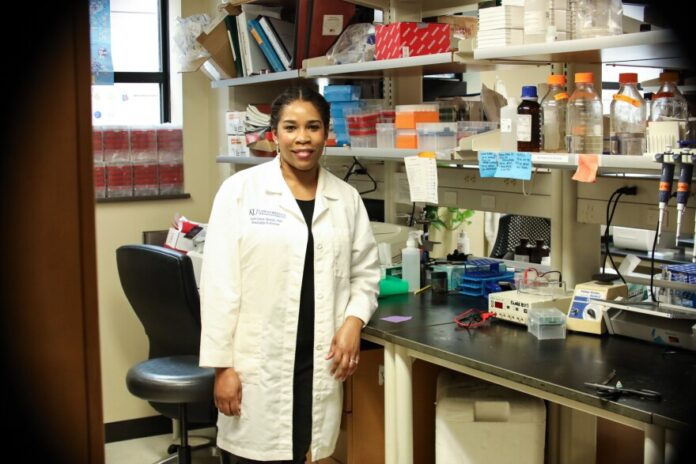KCUR | By Bek Shackelford-Nwanganga
Published April 30, 2025 at 1:44 PM CD
Triple negative breast cancer is aggressive and hard to treat. It also disproportionately affects Black women. A University of Kansas medical researcher is working to find out why and expand treatment options.
A Kansas medical researcher may have unlocked a new pathway to treatment for an aggressive form of breast cancer.
Dr. Joan Lewis-Wambi, a longtime researcher and professor of cancer biology at the University of Kansas Medical Center, said she and her research team have identified a protein that is overexpressed in Black women with triple negative breast cancer.
She said that discovery brings researchers one step closer to determining a targeted treatment therapy for the aggressive disease that disproportionately affects Black women.
Take a stand for local journalism.
Lewis-Wambi said breast cancer research is important because although it still impacts so many women, there are a lot of unanswered questions about how it works and who it affects.
“It’s really doing all that you can to help others, and it’s part of who I am as a scientist,” Lewis-Wambi said. “I do research, but beyond that, I think it’s my contribution to society.”
Triple negative breast cancer is an aggressive type of cancer that accounts for about 15% of breast cancer cases, according to the American Cancer Society. It’s called “triple negative” because the cancer cells do not have the three common receptors that are found in standard forms of breast cancer: estrogen, progesterone or HER2 protein. Lewis-Wambi said that makes the cancer hard to target.
“Most of the therapies that we have available blocks estrogen,” she said. “But because triple negative does not have the estrogen receptor, and it’s not dependent on estrogen, it makes it a lot harder to treat.”
The American Cancer Society reports that Black women are twice as likely as other women to develop triple negative breast cancer. They are also up to 40% more likely to die from all forms of the illness.
Lewis-Wambi said she wants to know why. She said things like access to health care are a contributing factor, but she’s mainly focused on biological factors.
“For triple negative, we really don’t understand the biology of the tumor,” she said. “Understanding if there are differences between different groups, I think that can help us in terms of designing novel treatments.”
That’s where the protein comes in. Lewis-Wambi said researchers do not yet know why the protein, called interferon-induced transmembrane protein 1, seems to be overexpressed in Black women with triple negative breast cancer. But it could potentially be a target for treatment.
Lewis-Wambi and her team plan to analyze more samples to confirm her findings. She and another researcher at the University of Tennessee want to focus on how the protein works.
Lewis-Wambi has decades of breast cancer research experience. She said she is interested in learning how to cure the disease for all women, but especially for Black women. The breast cancer mortality rate for women of other races has declined over the years, but not for Black women.
“We should be going in the opposite direction. We should be improving overall survival for patients,” she said. “When you don’t see that reflected in the data, it’s surprising. And it’s also very concerning because I want to know why that is.”
Lewis-Wambi has four daughters who are part of the inspiration for her research. She said data shows one in eight women will be diagnosed with breast cancer.
“It hits home,” Lewis-Wambi said. “When I look at their faces and I’m like, ‘Okay, there’s something that I could be doing to help you, but also help women in general.”
Bek Shackelford-Nwanganga reports on health care disparities and access for the Kansas News Service. You can email her at [email protected].
The Kansas News Service is a collaboration of KCUR, Kansas Public Radio, KMUW and High Plains Public Radio focused on health, the social determinants of health and their connection to public policy.
Kansas News Service stories and photos may be republished by news media at no cost with proper attribution and a link to ksnewsservice.org.




